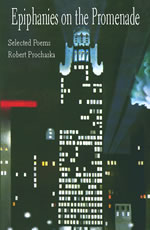
Epiphanies on the Promenade - Selected Poems
Robert Prochaska
ISBN 978-0962-5306-3-0
130 pages
Paperback - Poetry
Price: $14.95
June, 2004
This first, full-length collection of selected poems by New York poet Robert Prochaska is a fascinating tableau of works that transports the reader from the poet’s boyhood to life in New York City, In the process, he provides spiritual links between his generation and past generations that few poets have traversed. Whether describing a dead man walking into a Horn and Hardart automat, or depicting his father boldly strutting down Broadway in the 1940s, Prochaska presents a treasure trove of characters, places, natural wonders, historical references, and epiphanies that bum an indelible mark on the reader’s consciousness via the poet’s prescient imagination. But beyond Prochaska’s power to shape mythic allusions to iconic events, his poems also offer a unique assessment of modern lives struggling with the dying past, creating riveting poetry out of visceral worlds that have long since disappeared. Many of these poems find their mark through sheer audacity, searching for new orchestrations of words that freely merge metaphor with motion, jolting the reader with images that awaken and disturb. Yet there are also disarming moments wherein the poet feels the true meaning of mortality and loss. If virtuosity of language and the power to transform is a hallmark of the best modern poetry, Epiphanies on the Promenade stands out among the best by an American poet.
The Absinthe Literary Review
Solid and successful American free verse. Prochaska alternates between spare and orgiastic language to significant effect.
Scribd
As I read Epiphanies on the Promenade I learned I had a deep affinity with the book’s subject matter. Like the speaker, I spent “Half my life in the country, half in the city.” (“Prayer for Tonight”) We share a sense of wonder when we look back in time and see the winding path our lives have taken from the rural Midwest to bustling New York City.
The book’s first half consists largely of meditations on the speaker’s childhood and youth. A charismatic though alcoholic father and a dead brother haunt the speaker when he reflects upon his early life:
I wondered what it was like to breathe the dawn,
aching for food, alcohol swilling in your stomach
…
I wondered if you would answer the dead-of-night
rings, as you moved in netherworlds of lost children
one gone by loss of favor
one by death.
(“To Father, On the Night of Our Coming”)
Family dysfunction coupled with living in a sleepy river town cause the young speaker to dream of far-off places where things of consequence happen. Trains symbolize this yearning: “It’s easy to see trains slow crawl east / from my hill overlooking the Mississippi. / Occasionally a freighter stops / and smoke billows out of the high trees / for the sake of a glum son like me.”
(“Elegant Faces”)
To escape his stifling environment, if only temporarily, he hops “the next freight in my dream.” (“Quest”). This is a classic urge shared by every country boy living within bicycling distance of train tracks.
Prochaska’s speaker eventually succeeds in fulfilling this dream by leaving small town life behind. He lands in New York City, where myriad cacophonous sights and sounds awaken his senses: “Shy types breeze into town / and level it with their whatever grins; / we go under a
new beat / rip the old grain apart.” (“NYC, October Night”) The city seduces, but it also scares:
I beg of myself to hang in
and spin the web I will become.
I am a wild-haired boy
who likes to roam, and wills himself
o’er the plain.
I am goose-eyed and take wrong turns.
Sounds seem to part the waves in this city, I think. (“Alone, To New York”) As the speaker matures, however, his past catches up with him, and he ruminates on it. At first, he feels triumphant and not a little vindictive:
I’m mad at what happened to me,
here in a desolate place of my own choosing.
I’m mad because my father mocked my writing
in the hot June of my last Illinois summer
…
The knife is the city, and I its hand.
(“Contemplating New York, Again”)
With the passage of time the speaker reaches an accommodation with his past and forgives his father for the injuries he suffered:
Half-mad, half-saint, you tried to grip the edge
of the mahogany bar,
the palm of your hand feeling for the grit.
As I sit here I ask no more questions,
for the things you and I wanted are similar.
(“Ninety”)
He even feels wistful about his experiences growing up:
I just want to play with my cowboy and Indian figures
in a mud puddle along the Mississippi.
(“Gruesome Morning”)
These feelings come naturally with age, but I can attest from my own experience that a conflicted longing for a simpler time and place enters into the emotions of us displaced small- town folk. Something of this sentiment is contained in the memorable William Faulkner quote: “The past is not dead. In fact, it’s not even past.” I’m sure Prochaska had this phrase in mind when crafting these excellent poems.
